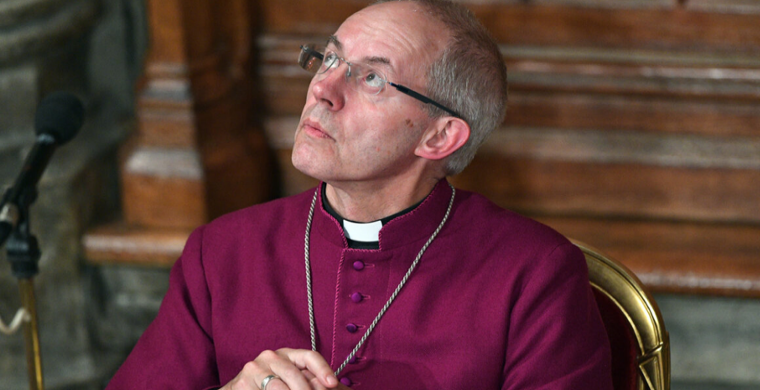COME, LET US CONFER, Part 2: Justin Welby Enters the Fray
By Dr. Stephen Noll
https://stephenswitness.org/
March 7, 2021
This is a continuation of my recent appeal "Appeal to the Leadership of the Global Anglican Future Conference."
Right on cue, Justin Welby, the Archbishop of Canterbury, seconded shortly thereafter by Stephen Cottrell, the Archbishop of York, jumps into the fray uninvited, accusing Henry Ndukuba, the Archbishop of Nigeria, of homophobia, the one unforgivable sin in the index of the Pansexual Revolution.
Archbishop Welby proceeds to rebuke Archbishop Ndukuba for violating the "agreed teaching of the Anglican Communion," namely, the 1998 Lambeth Resolution I.10 on Human Sexuality.
Welby zooms in on "paragraphs c and d" of the Resolution since those are the particular clauses that speak of "homosexuals" ("gay" had not become coin of the realm in 1998). I shall come back to those clauses, but we should read the Resolution from the beginning, which states: "This Conference,
in view of the teaching of Scripture, upholds faithfulness in marriage between a man and a woman in lifelong union, and believes that abstinence is right for those who are not called to marriage;
Welby offers a truncated version of this clause as "the traditional view of Christian marriage." He does not mention the second half about abstinence because he has been promoting a third way of long-term homosexual partnerships.
Welby even distorts the careful wording of the text when it refers to homosexuality. Paragraph (c) notes that among church members, there are "persons who experience themselves as having a homosexual orientation." This language was carefully vetted by the bishops at Lambeth. They wished to acknowledge the reality of same-sex attraction as a consciousness which orients a person's desires powerfully, even if that consciousness is disordered by fallen human nature (Rom 1:24-27). That orientation, the bishops said, is no more damnable than any other of the temptations that flesh is heir to, nor is it beyond the pastoral reach of the Church and the transforming grace of God. Just as any godly pastor must listen to the sins of his people, so the Church needs to be aware of the social, psychological, and spiritual context of the "experience" of homosexuality. The bishops of the ACNA who produced the Sexuality and Identity statement were performing this task in our postmodern context where "identity" has replaced "consciousness" and practice has replaced "orientation." They are seeking to help sincere Christians to direct their hearts into single lives of service or in some cases to reorient their desires and find fulfilment in marriage.
Once again, Welby cites paragraph (d) only in part. It reads: This Conference, while rejecting homosexual practice as incompatible with Scripture, calls on all our people to minister pastorally and sensitively to all irrespective of sexual orientation and to condemn irrational fear of homosexuals, violence within marriage and any trivialisation and commercialisation of sex;
The Archbishop leaves out the first, normative clause (italicized) in order to get to the presumed condemnation of homophobia. Even in 1998, the word "homophobia" was being used by the gay rights lobby to tar anyone who opposed its agenda. For this very reason, the Resolution speaks of "irrational fear of homosexuals" and links it with other examples of sexual abuse. They were saying that such an irrational fear is a violation of the compassion Jesus requires of His church for the outcasts of society -- the "tax collectors and prostitutes" (Matt 21:31-32).
Welby leaps to the assumption that the language of the Nigerian statement is homophobic. To be sure, it is blunt, inflammatory, and, frankly, obscure: "A Gay is a Gay, they cannot be rightly described otherwise." That phrasing sounds more like LGBT promotion than the Good News of the Kingdom.
Fellow bishops should indeed question and challenge this use of language. But to do so, they have to be fellow bishops.
Welby ends his rebuke with this bromide: "the Anglican Communion continues to seek to walk together amidst much difference." That's simply not true. By his continuous refusal to listen to the confessing churches of the Global South and his exclusion of the Anglican Church in North America from participation, Justin Welby has forfeited his chance to confer fruitfully and instead seems more interested in assuaging the affections of his audience at home than in making a difference in the wider Anglican Communion.
So I repeat my plea to the leaders of the Global Anglican Future Conference: Ignore Cantuar -- he is just making trouble -- but do not neglect the demands of true fellowship. Come and reason together.
Photo Credit: Flickr Commons














